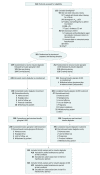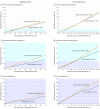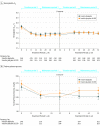Effect of Insulin Degludec vs Insulin Glargine U100 on Hypoglycemia in Patients With Type 1 Diabetes: The SWITCH 1 Randomized Clinical Trial
- PMID: 28672316
- PMCID: PMC5817477
- DOI: 10.1001/jama.2017.7115
Effect of Insulin Degludec vs Insulin Glargine U100 on Hypoglycemia in Patients With Type 1 Diabetes: The SWITCH 1 Randomized Clinical Trial
Abstract
Importance: Hypoglycemia, common in patients with type 1 diabetes, is a major barrier to achieving good glycemic control. Severe hypoglycemia can lead to coma or death.
Objective: To determine whether insulin degludec is noninferior or superior to insulin glargine U100 in reducing the rate of symptomatic hypoglycemic episodes.
Design, setting, and participants: Double-blind, randomized, crossover noninferiority trial involving 501 adults with at least 1 hypoglycemia risk factor treated at 84 US and 6 Polish centers (January 2014-January 12, 2016) for two 32-week treatment periods, each with a 16-week titration and a 16-week maintenance period.
Interventions: Patients were randomized 1:1 to receive once-daily insulin degludec followed by insulin glargine U100 (n = 249) or to receive insulin glargine U100 followed by insulin degludec (n = 252) and randomized 1:1 to morning or evening dosing within each treatment sequence.
Main outcomes and measures: The primary end point was the rate of overall severe or blood glucose-confirmed (<56 mg/dL) symptomatic hypoglycemic episodes during the maintenance period. Secondary end points included the rate of nocturnal symptomatic hypoglycemic episodes and proportion of patients with severe hypoglycemia during the maintenance period. The noninferiority criterion for the primary end point and for the secondary end point of nocturnal hypoglycemia was defined as an upper limit of the 2-sided 95% CI for a rate ratio of 1.10 or lower; if noninferiority was established, 2-sided statistical testing for superiority was conducted.
Results: Of the 501 patients randomized (mean age, 45.9 years; 53.7% men), 395 (78.8%) completed the trial. During the maintenance period, the rates of overall symptomatic hypoglycemia were 2200.9 episodes per 100 person-years' exposure (PYE) in the insulin degludec group vs 2462.7 episodes per 100 PYE in the insulin glargine U100 group for a rate ratio (RR) of 0.89 (95% CI, 0.85-0.94; P < .001 for noninferiority; P < .001 for superiority; rate difference, -130.31 episodes per 100 PYE; 95% CI, -193.5 to -67.16). The rates of nocturnal symptomatic hypoglycemia were 277.1 per 100 PYE in the insulin degludec group vs 428.6 episodes per 100 PYE in the insulin glargine U100 group, for an RR of 0.64 (95% CI, 0.56-0.73; P < .001 for noninferiority; P < .001 for superiority; rate difference, -61.94 episodes per 100 PYE; 95% CI, -83.85 to -40.03). A lower proportion of patients in the insulin degludec than in the insulin glargine U100 group experienced severe hypoglycemia during the maintenance period (10.3%, 95% CI, 7.3%-13.3% vs 17.1%, 95% CI, 13.4%-20.8%, respectively; McNemar P = .002; risk difference, -6.8%; 95% CI, -10.8% to -2.7%).
Conclusions and relevance: Among patients with type 1 diabetes and at least 1 risk factor for hypoglycemia, 32 weeks' treatment with insulin degludec vs insulin glargine U100 resulted in a reduced rate of overall symptomatic hypoglycemic episodes.
Trial registration: clinicaltrials.gov Identifier: NCT02034513.
Conflict of interest statement
Figures



Comment in
-
Hypoglycemia in Diabetes: Does Insulin Type Matter?JAMA. 2017 Jul 4;318(1):31-32. doi: 10.1001/jama.2017.8075. JAMA. 2017. PMID: 28672298 No abstract available.
-
Insulin Analogues and Hypoglycemia in Patients With Type 1 Diabetes.JAMA. 2017 Nov 14;318(18):1828. doi: 10.1001/jama.2017.14775. JAMA. 2017. PMID: 29136437 No abstract available.
-
Insulin degludec U100 is associated with lower risk for severe and symptomatic hypoglycemia as compared with insulin glargine U100 in subjects with type 1 diabetes.Ann Transl Med. 2018 Feb;6(3):63. doi: 10.21037/atm.2017.12.28. Ann Transl Med. 2018. PMID: 29610753 Free PMC article. No abstract available.
References
-
- Frier BM. Hypoglycaemia in diabetes mellitus: epidemiology and clinical implications. Nat Rev Endocrinol. 2014;10(12):711-722. - PubMed
-
- Leiter LA, Yale J-F, Chiasson J-L, Harris S, Kleinstiver P, Sauriol L. Assessment of the impact of fear of hypoglycemic episodes on glycemic and hypoglycemia management. Can J Diabetes. 2005;29(3):186-192.
-
- Nathan DM, Genuth S, Lachin J, et al. ; Diabetes Control and Complications Trial Research Group . The effect of intensive treatment of diabetes on the development and progression of long-term complications in insulin-dependent diabetes mellitus. N Engl J Med. 1993;329(14):977-986. - PubMed
-
- Heise T, Nosek L, Rønn BB, et al. . Lower within-subject variability of insulin detemir in comparison to NPH insulin and insulin glargine in people with type 1 diabetes. Diabetes. 2004;53(6):1614-1620. - PubMed
Publication types
MeSH terms
Substances
Associated data
LinkOut - more resources
Full Text Sources
Other Literature Sources
Medical

